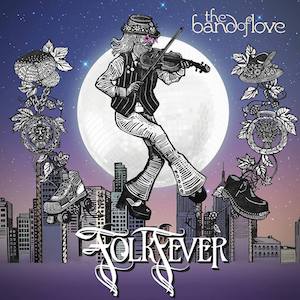 The Band of Love – Folk Fever
The Band of Love – Folk Fever
Island – 7 September 2018
Another genre transposition album, the brainchild of producer and multi-instrumentalist Mark Tucker, Folk Fever brings together folk music luminaries Jim Causley, Greg Russell, Alice Jones, Phillip Henry and Hannah Martin who, along with contributions from the likes of Mike McGoldrick, Matt Downer, Phil Beer, Steve Knightley and Patsy Reid have taken a collection of disco and dance floor classics and given them a folk makeover.
Indeed, so brilliantly have these songs been deconstructed and reassembled, unless you were aware of their original incarnations or noted the 70s phraseology you might easily assume many of them to be either traditional or traditional-styled folk songs. Case in point is the Russell-sung opening track, fiddle, uillean pipes, whistle and bodhran leading the charge on a spirited Irish folk reading of George Benson celebratory Gimme The Night.
For Tucker, the litmus test was Patrick Hernandez’ Born to be Alive, working on the basis that if they could make this sound like a folk song, then everything else would be a walk in the park. Slowing the tempo down and arranging it for Appalachian dulcimer, with Causley on lead and accordion with McGoldrick adding pipes, flute and mandola, it works brilliantly.
The epitome of Giorgio Moroder’s brand of Eurodisco, sung by Russell, Jones, Causley and Martin, Donna Summer’s I Feel Love with its hypnotic rhythm and repeated title line is transformed into an Appalachian folk tune with Leon Hunt on banjo, John Joe Kelly on bodhran and guest appearances from Steve Knightley and Phil Beer on mandocello/tenor guitar and violin/mandolin, respectively.
Perhaps the closest to the original is Martin soulfully accompanying herself on violin for classic Rose Royce ballad Love Don’t Live Here Anymore, Phil Henry providing the acoustic guitar and Jones adding clarinet colour. Interestingly, a song that has become both a camp cult and an anthem to female self-determination, Gloria Gaynor’s I Will Survive features no women at all, Russell taking the lead backed by Henry and Tucker on acoustic guitars with Downer on double bass for a slower, jazzier reading with guitar body slap percussion. The mood continues with an equally slower and dreamier ballad tempo take on Candi Staton’s Young Hearts Run Free, sung as a duet by Martin and Causley and arranged for double bass, violin and mandolin, complemented by Russell, accompanied by bass, acoustic guitar and soft percussion, on Harold Melvin and the Blue Notes’ The Love I Lost, an abrupt ending ready to catch out any unprepared radio presenters.
A personal favourite brings Jones to the spotlight as, backed by concertina, accordion, piano, double bass, mandolin, acoustic guitar, clarinet and violin, evoking thoughts of Greensleeves, she delivers a shimmeringly beautiful, autumnal lullabying folk interpretation of Hot Chocolate’s I’ll Put You Together Again, Russell, Causley and Tucker joining in for the waltzing chorus.
I was never a fan of The Average White Band’s instrumental jazz-funk jam Pick Up The Pieces, but it undergoes a cultural shift here from Black American to a puttering, heady Irish jazz-folk groove that’s primarily a multi-instrumental showcase for Tucker textured by Patsy Reid’s violin, Kelly’s bodhran, Jones on body slaps and Dutch musician Rune Cygan Barslund on whistle and accordion.
Unquestionably one of the seminal 70s disco numbers and featured in the globally successful Saturday Night Fever, with Beer on dobro and mandolin and Kelly again on bodhran, sung by Causley the Bee Gees’ Night Fever becomes an Irish reel while, moving down to the American delta with Henry blowing harmonica, Tucker providing the drum thump rhythm and Knightley on mandocello, all four singers join together for a bluesy stomp through Sister Sledge’s We Are Family.
Causley takes the lead on the remaining two tracks, first up being Back To My Roots an atmospheric, brooding trad-folk reinvention of Odyssey’s 1985 Afro-Funk Going Back To My Roots, again featuring Beer and Knightley. The album ends with a return to Gloria Gaynor for another self-asserting dancefloor filler, I Am What I Am reimagined here as a wistful almost early 20th century music hall style folk ballad with Causley accompanied only by accordion and Gavin Atkin on concertina providing an inspired curtain closer to an inspired album that, once again, proves that, in the hands of the right musicians, a good song can transcend all musical borders.
